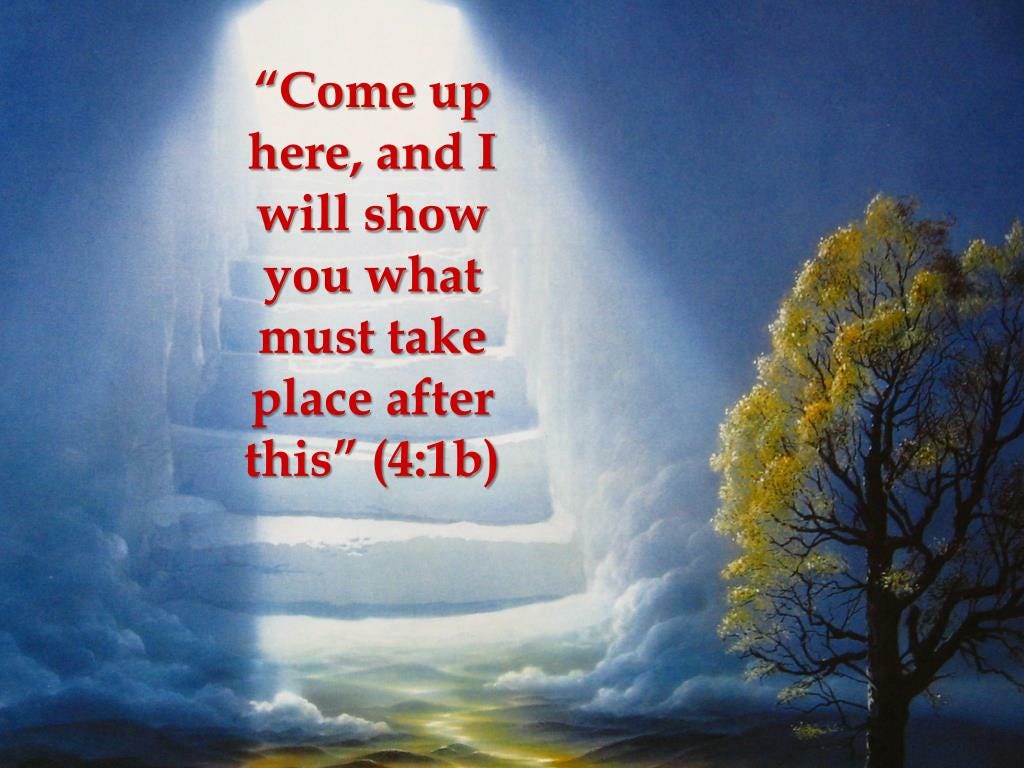In Revelation 4, John gets a peak into heaven’s throne room. The first thing John sees, past the door to heaven, is “one seated on the throne.” He is the center and the source for everything else. That’s important. That’s crucial. Many people think and talk about God as if He were peripheral, a supporting actor in our lives. We naturally think we’re the star; that our life — and so life itself — is about us. Me. God is there to help me be better, carry me through the hard times (so I can scold Him if I see only one set of footprints in the sand of my life); He exists to give me the family or things I want, help me succeed. God is about me. And if He’s not about me, what good is He? And so many people’s idea of heaven is also all about them. It’s an eternal family reunion, and if Jesus drops by to say “Hi”, that’s great, but that’s not what it’s really about. It’s all about me. I’m the subject. I’m the center.
But immediately, John sees into the center of heaven and sees that it is centered on “Him who sits on the throne.” John heard Jesus’ voice, “like a trumpet,” telling him, “Come up here,” to heaven. “I will show you what must take place after this.”
Revelation is about what “must take place.” “Must” means it is necessary. It is not possible that any thing else happens other than what Jesus will show. The future is not open. It is set. What God has determined will happen, must happen. The future does not depend on our choices. Our choices depend on what God has said must happen. This is important because, again, God is at the center. He is the subject. He’s the one seated on the throne.
Those who argue that the future is not set are assuming that it depends on human choices instead of God’s decrees; that we can’t see the future because it depends on our free will, which no one can know. It’s like the “butterfly effect.” The world is too complex and dynamic; even a small change can lead to unpredictable outcomes. The flap of a butterfly’s wings in Brazil can set off a tornado in Texas, so no one can know what will happen in the future. But God says to John, this is '“what must take place.” It must take place because He who is seated on the throne has decided it will take place. As Jesus said, you don’t lose one hair without God knowing it, so we can say, every flap of every butterfly’s wings must happen as God has determined.
Immediately, John says he was “in the spirit,” in a vision, seeing spiritual things. He sees the throne — the seat of authority — and he sees “Him sitting on the throne.” We’d normally expect a description of “He who sits on the throne.” What does He look like? But He’s indescribable, both because He is beyond words and because we are not to try to describe or picture God. Even in Revelation, with all its symbolic imagery, there’s not a symbolic portrait of God. There was one of Jesus in chapter one. He was like a “son of man,” dressed like a priest, hair pure white like snow (for purity); eyes like a lasers (for Him being all-seeing), feet like bronze (for being unshakeable), with a sharp sword coming out of His mouth (for His Word). The Son became incarnate and so could be seen, but even then, His description is symbolic.
Now, with the Father, we’re told He’s the subject; He’s on the throne, ruling. But He’s so indescribable — you can’t describe Him and you shouldn’t even try to portray Him, even symbolically — John doesn’t. He says “Him who sits on the throne” had “the appearance of a stone of jasper and carnelian.” Jasper is translucent, shiny, a crystal. Carnelian is fiery red. He’s saying “Him who sits on the throne” is solid like a stone and shines and blazes, with a transcendent brightness. That’s Him, the subject.
Around the throne was a “rainbow” except that, instead of shining with all the colors, it shone like an emerald — another gem. The word for “rainbow” which only occurs here in Revelation in the Bible, is a word you’ll recognize: iris, like in your eye. It could mean a halo. He who “sits on the throne” was shiny with fiery red, and around Him was a rich green halo, emanating majesty and holiness. He’s the center of this scene.
That’s the way our lives are to be. God is in the center — not money or family or success or ego —- and everything is centered on, coming from, or aimed at Him.
For the entire exposition of Revelation 4, listen:
Covenant Reformed Baptist Church is Danville’s & Caswell County’s Reformed church.







Wow, this is good. Praise be to God!